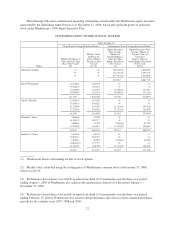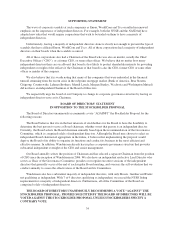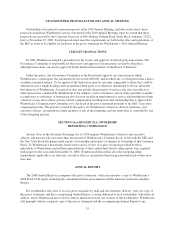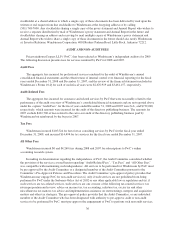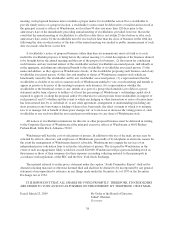Windstream 2008 Annual Report Download - page 38
Download and view the complete annual report
Please find page 38 of the 2008 Windstream annual report below. You can navigate through the pages in the report by either clicking on the pages listed below, or by using the keyword search tool below to find specific information within the annual report.To date ten other companies have agreed to an Advisory vote, including Verizon, MBIA, H&R Block,
Ingersoll Rand, Blockbuster, and Tech Data. TIAA-CREF, the country’s largest pension fund, has successfully
utilized the Advisory Vote twice.
Influential proxy voting service RiskMetrics Group recommends votes in favor, noting: “RiskMetrics
encourages companies to allow shareholders to express their opinions of executive compensation practices by
establishing an annual referendum process. An advisory vote on executive compensation is another step forward
in enhancing board accountability.”
The Council of Institutional Investors endorsed advisory votes and a bill to allow annual advisory votes
passed the House of Representatives by a 2-to-1 margin. We believe company leaders should adopt an Advisory
Vote voluntarily before required by law.
We believe that existing U.S. Securities and Exchange Commission rules and stock exchange listing
standards do not provide shareholders with sufficient mechanisms for providing input to boards on senior
executive compensation. In contrast, in the United Kingdom, public companies allow shareholders to cast a vote
on the “directors’ remuneration report,” which discloses executive compensation. Such a vote isn’t binding, but
gives shareholders a clear voice that could help shape senior executive compensation.
We believe that a company that has a clearly explained compensation philosophy and metrics, reasonably
links pay to performance, and communicates effectively to investors would find a management sponsored
Advisory Vote a helpful tool.
We urge Windstream’s board to allow shareholders to express their opinion about senior executive
compensation through an Advisory Vote.
BOARD OF DIRECTORS’ STATEMENT
IN OPPOSITION TO THE STOCKHOLDER PROPOSAL
The Board of Directors unanimously recommends a vote “AGAINST” the Stockholder Proposal for the
following reasons:
This proposal seeks to solicit a non-binding vote from stockholders regarding the compensation provided to
the executives named in the Company’s Summary Compensation Table (the “Named Executive Officers”). For
the reasons explained below, the Directors believe that adopting the proposal is unnecessary and not in the best
interest of the Company and its stockholders.
The Board believes that its Compensation Committee uses an effective process for establishing executive
compensation. The Compensation Committee is responsible for establishing and maintaining a competitive and
fair compensation policy that attracts, motivates and retains the talented employees necessary to execute the
Company’s strategies and achieve its goals. To this end, the Committee, which is comprised entirely of
independent directors, is responsible for setting compensation for the CEO and recommending the compensation
of the other senior executives. When establishing programs or setting compensation levels, the Committee makes
numerous complicated and inter-related decisions, all requiring judgment and careful consideration of various
relevant factors.
In addition, the Compensation Committee considers both public and confidential information about the
Company’s strategies and performance when assessing executive performance and setting compensation. Some
of this information could not be made available to stockholders without also providing proprietary competitive
data to the Company’s competitors. As proposed, stockholders would therefore be asked to endorse or reject
compensation decisions without complete information or, alternatively, to have the Company disclose
competitive information in a public document.
32


